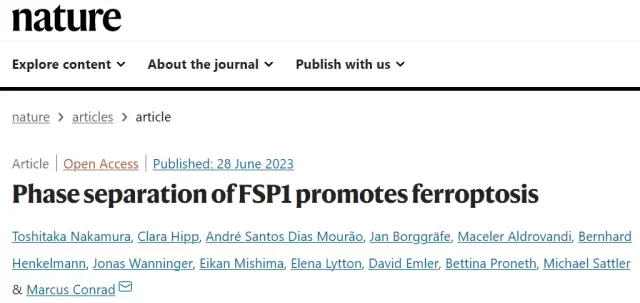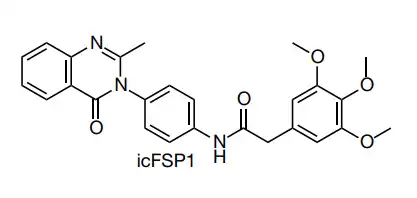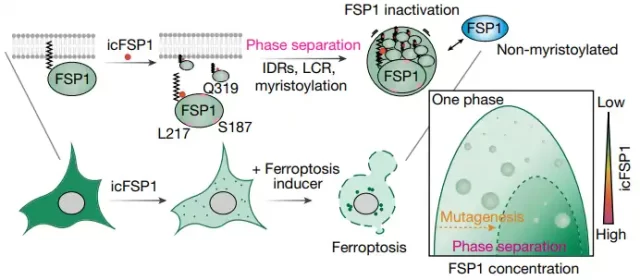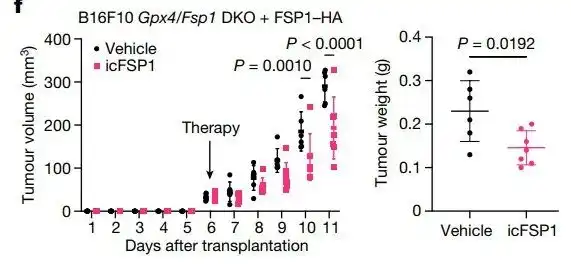New way to treat cancers: Phase separation of FSP1 promotes ferroptosis
- Normal Liver Cells Found to Promote Cancer Metastasis to the Liver
- Nearly 80% Complete Remission: Breakthrough in ADC Anti-Tumor Treatment
- Vaccination Against Common Diseases May Prevent Dementia!
- New Alzheimer’s Disease (AD) Diagnosis and Staging Criteria
- Breakthrough in Alzheimer’s Disease: New Nasal Spray Halts Cognitive Decline by Targeting Toxic Protein
- Can the Tap Water at the Paris Olympics be Drunk Directly?
New way to treat cancers: Phase separation of FSP1 promotes ferroptosis
- Should China be held legally responsible for the US’s $18 trillion COVID losses?
- CT Radiation Exposure Linked to Blood Cancer in Children and Adolescents
- FDA has mandated a top-level black box warning for all marketed CAR-T therapies
- Can people with high blood pressure eat peanuts?
- What is the difference between dopamine and dobutamine?
- How long can the patient live after heart stent surgery?
New way to treat cancers: Phase separation of FSP1 promotes ferroptosis.
It is well known that during the development of multicellular organisms, there are a variety of predetermined and precisely controlled programmed cell death , such as apoptosis (Apoptosis) , programmed necrosis (Necroptosis) , cell death (Pyroptosis) , and iron Death (Ferroptosis) , etc.
Ferroptosis is a new type of iron-dependent programmed cell death discovered by Brent. R. Stockwell Laboratory of Columbia University in 2012. It is induced by excessive accumulation of peroxidized lipids . Its morphological characteristics and functions The method and molecular mechanism are quite different from other forms of programmed death.
At the same time, there are multiple defense pathways against ferroptosis in cells, the most important of which is mediated by glutathione peroxidase 4 (GPX4) , which specifically catalyzes the process through glutathione (GSH) . Oxidizes lipids to inhibit ferroptosis.
In October 2019, the Marcus Conrad team of Helmholtz Munich Research Center in Germany published a paper in Nature [1] , which identified FSP1 as a new type of potent ferroptosis inhibitor independent of glutathione , through the production of coenzyme Q10 Antioxidant forms of (CoQ) promote cancer cell resistance to ferroptosis.
In August 2022 , Marcus Conrad’s team published a paper in Nature [2] , which found that the fully reduced form of vitamin K (vitamin K hydroquinone, VKH 2 ) can act as an antioxidant and effectively inhibit cell ferroptosis.
This study also reveals that FSP1 is a reductase that efficiently reduces vitamin K to vitamin K hydroquinone (VKH 2 ) , thereby driving a new non-canonical vitamin K cycle.
On June 28, 2023, Marcus Conrad’s team published a research paper entitled: Phase separation of FSP1 promotes ferroptosis in Nature .
The study found that phase separation of FSP1 promotes ferroptosis and led to the development of a new anticancer drug called icFSP1, which sensitizes cancer cells to ferroptosis.
This study discovered an inhibitor of ferroptosis inhibitor FSP1 – icFSP1 . icFSP1 exhibits a unique mechanism of action, which promotes ferroptosis in cancer cells by triggering the phase separation of FSP1, thereby inhibiting tumor growth.
This study revealed for the first time the link between ferroptosis and phase separation, and based on this, a new concept of cancer therapy by promoting FSP1 phase separation and ferroptosis was proposed.

Chemotherapy resistance or tumor metastasis is an important clinical problem in cancer treatment. Notably, some malignant cancer cells acquire intrinsic sensitivity to ferroptosis during dedifferentiation or metabolic remodeling. Targeting ferroptosis thus shows great promise as a new approach for cancer therapy.
In vivo applicable FSP1 inhibitors – icFSP1
In the 2019 Nature paper, Marcus Conrad’s team has identified the first FSP1-specific inhibitor – iFSP1 . However, iFSP1 is not suitable for in vivo use, and it will have off-target effects at high concentrations.
In order to develop effective FSP1 inhibitors in vivo, the research team screened about 10,000 small molecules and conducted DMPK (Drug Metabolism and Pharmacokinetics) verification studies, and finally discovered and determined a new in vivo effective The FSP1 inhibitor, icFSP1 , sensitizes many human cancer cells to ferroptosis and inhibits tumor growth in vivo.
 Structure of icFSP1
Structure of icFSP1
icFSP1 triggers FSP1 phase separation
The research team further studied the potential mechanism of icFSP1 on FSP1, and the results showed that, unlike the previously discovered inhibitor iFSP1, icFSP1 does not competitively inhibit the activity of FSP1 enzymes, but induces the relocation and aggregation of FSP1 from the cell membrane to the cell , synergizes with glutathione peroxidase 4 (GPX4) inhibition.
 icFSP1 mechanism of action
icFSP1 mechanism of action
These findings suggest that icFSP1 does not directly inhibit the activity of the FSP1 enzyme, but instead triggers phase separation of FSP1. icFSP1 can strongly inhibit tumor growth in vivo, and there is obvious formation of FSP1 aggregates in tumor tissue.
 icFSP1 inhibits tumor growth
icFSP1 inhibits tumor growth
Iron death linked to phase separation for the first time
Biomacromolecules can form biomolecular condensates through liquid-liquid phase separation (LLPS, referred to as phase separation ) mediated by multivalent weak interactions.
Recent studies have shown that phase separation is closely related to neurodegenerative diseases, cancer , virus infection and other major diseases are closely related, and disease treatment targeting the phase separation process has become a new frontier of biomedicine.
Ferroptosis is of great interest to researchers in many fields, from cancer to neurodegenerative diseases, as it is a fundamental physical phenomenon of signal transduction and fundamental biology relevant to a variety of diseases. This study is the first to reveal a link between ferroptosis and phase separation.
On the basis of these findings, the research team proposed a new concept of cancer therapy by promoting FSP1 phase separation and ferroptosis.
Professor Marcus Conrad said the research would provide an excellent model for the further development of innovative treatments for diseases, including cancer, where ferroptosis-phase separation plays an important role. This offers a promising prospect for future treatments.
Paper link :
1. https://www.nature.com/articles/s41586-019-1707-0
2. https://www.nature.com/articles/s41586-022-05022-3
New way to treat cancers: Phase separation of FSP1 promotes ferroptosis
(source:internet, reference only)
Disclaimer of medicaltrend.org
Important Note: The information provided is for informational purposes only and should not be considered as medical advice.



